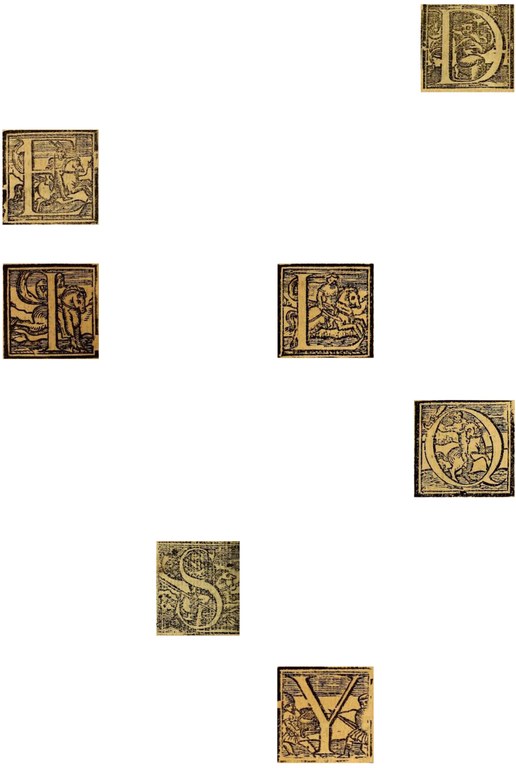6055B
Decorated Initials
Decorated Initials

- Artist
- Workshops of Antonio Ricardo and Francisco del Canto
- Title
- Decorated Initials (White Roman initials over historiated backgrounds).
- Date
- 1585-1603
- Medium
- Woodcut or woodcut printing. About 28mm x 28mm. Printed in the following works: Confessionario para los curas de indios[.] Lima: Antonio Ricardo, 1585 [Letters E, I, L, Q, S, Y (all six shown here but inverting the S for readability) — Luis de Velasco, Para que los indios no sean oprimidos ni detenidos[.] Auto de oficio. Lima: Antonio Ricardo, 1603 [Letter E] — Luis de Velasco. Para que los indios yanaconas no puedan ser detenidos[.] Auto de oficio. Lima: Antonio Ricardo, 1603 [Letter E]. Luis de Valdivia, Arte y gramática general[.] Lima: Francisco del Canto, 1606 [Letter Q] — Francisco Iuan Garreguilla, Libro de Plata Reduzida[.] Lima: Francisco del Canto, 1607 [Letter Y]. Diego Flores, Preciosa Margarita[.] Lima: Francisco del Canto, 1611 [Letters D (shown here), S] — Ludovico Bertonio, Vocabulario de la lengua aymara[.] Juli: Francisco del Canto, 1612 [Letter D] — Ludovico Bertonio, Libro de la vida y milagros de Iesu Christo. Juli: Francisco del Canto, 1612 [Letter D] — Provissiones y cartas del Rey Philippe Tercero[.] Lima: Francisco del Canto, 1612 [Letter D] — Bartholome Lobo Guerrero, Constituciones Synodales[.] Lima: Fancisco del Canto, 1614 [Letters D, E].
- Location
- Antigua imprenta de Antonio Ricardo, Lima, Perú. Antigua Imprenta de Francisco del Canto, Lima, Perú.
- Photo Source
- Mori 2013a || Mori 2013b. Not reproduced at scale vis-à-vis the images of the impressions in 6055A.
- Correspondence Credit
- Rodríguez-Buckingham 1977, 117 noted that letters E, I, L were printed in Luis Mexia Ponce de León, Laconismus[.] Sevilla: Apud Ioanem Gotherrium Typographum, in via Genuensi, 1569.
- Note
- Line-by-line similarities between the images of 6055A and 6055B suggest that D, E, I, L, S, Y were printed from one and the same set of types (Q shows differences). Said types were printed in Seville by Juan Gutiérrez between 1559 and 1570. Antonio Ricardo was an Italian typographer who worked in Venice, Lyon, Valladolid, and Medina del Campo. In 1570, Ricardo left Europe and traveled to Mexico to become one of the first publishers of the New World. So Ricardo could have acquired our types in Seville —the required point of departure for the Indies— and brought them along in his transatlantic journey. Ricardo could then print these types, first in Mexico City with his associate, Pedro Ocharte, and then in Lima, where he relocated in 1580. Ricardo printed these types through his death in 1606 and passed them on to Francisco del Canto.
- Item
- 6055B

